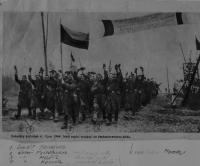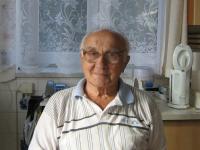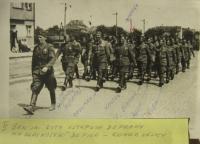My biggest honour is, that God kept my common sense, healthy legs and hands

Stáhnout obrázek
Vítězslav Moravec was born on March 20th, 1925 in the village of Ksaverovka in Volhynia, Poland. His family had Baptist beliefs, shortly after he was born they moved to Čolnice village, where a Baptist chapel resided, here he spent all his childhood. In 1944, after Volhynia was liberated by the Red army, he voluntarily joined the Czechoslovak Army troops. He was placed into the pioneer unit. With the unit, he underwent a journey via Bessarabia, Bukovina and Poland over the Buzuluk to Czechoslovakia. He was close to death on several occasions. After the demobilization, he left the army and settled down in the village of Vikýřovice in the Šumperk region. From 1948 until his retirement he worked at the MEZ (Moravian Electrician Factory) company in the town of Postřelmov. The Baptist religion accompanied him through his whole life. He lives still in the village of Vikýřovice.




